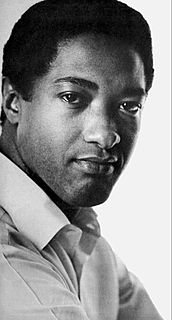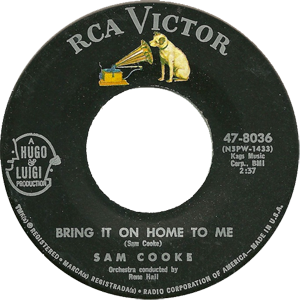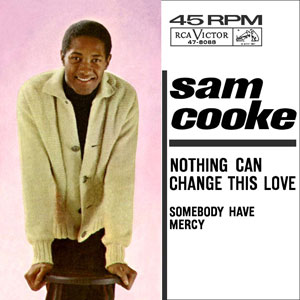
Samuel Cook, known professionally as Sam Cooke, was an American singer, songwriter, and entrepreneur. Considered to be a pioneer and one of the most influential soul artists of all time, Cooke is commonly referred to as the "King of Soul" for his distinctive vocals, notable contributions to the genre and high significance in popular music.
"Tennessee Waltz" is a popular country music song with lyrics by Redd Stewart and music by Pee Wee King written in 1946 and first released in January 1948. The song became a multimillion seller via a 1950 recording – as "The Tennessee Waltz" – by Patti Page. As of 1974, it was the biggest-selling song ever in Japan.

"A Change Is Gonna Come" is a song by American recording artist Sam Cooke. It initially appeared on Cooke's album Ain't That Good News, released mid-February 1964 by RCA Victor; a slightly edited version of the recording was released as a single on December 22, 1964. Produced by Hugo & Luigi and arranged and conducted by René Hall, the song was the B-side to "Shake".

"Wonderful World" is a song by American singer-songwriter Sam Cooke. Music arrangement was by the prolific Belford Hendricks who also wrote the arrangements for the songs "You Send Me", "Cupid", "Chain Gang", "(I Love You) For Sentimental Reasons", and "A Change Is Gonna Come". Released on April 14, 1960, by Keen Records, it had been recorded during an impromptu session the previous year in March 1959, at Sam Cooke's last recording session at Keen. He signed with RCA Victor in 1960 and "Wonderful World," then unreleased, was issued as a single in competition. The song was mainly composed by songwriting team Lou Adler and Herb Alpert, but Cooke revised the lyrics to mention the subject of education more.

"You Send Me" is a song written and originally recorded by American singer Sam Cooke, released as a single in 1957 by Keen Records. Produced by Bumps Blackwell and arranged and conducted by René Hall. The song, Cooke's debut single, was a massive commercial success, becoming a No. 1 hit on both Billboard's Rhythm & Blues Records chart and the Billboard Hot 100.

"Bring It On Home to Me" is a song by American soul singer Sam Cooke, released on May 8, 1962 by RCA Victor. Produced by Hugo & Luigi and arranged and conducted by René Hall, the song was the B-side to "Having a Party". The song peaked at number two on Billboard's Hot R&B Sides chart, and also charted at number 13 on the Billboard Hot 100. The song has become a pop standard, covered by numerous artists of different genres. It is one of The Rock and Roll Hall of Fame's 500 Songs that Shaped Rock and Roll.

"Little Red Rooster" is a blues standard credited to arranger and songwriter Willie Dixon. The song was first recorded in 1961 by American blues musician Howlin' Wolf in the Chicago blues style. His vocal and slide guitar playing are key elements of the song. It is rooted in the Delta blues tradition and the theme is derived from folklore. Musical antecedents to "Little Red Rooster" appear in earlier songs by blues artists Charlie Patton and Memphis Minnie.

Portrait of a Legend: 1951–1964 is a compilation album by American singer-songwriter Sam Cooke, released posthumously on June 17, 2003, by ABKCO Records. The disc covers Cooke's entire career, from his early 1950s beginnings with the Soul Stirrers to the posthumous 1964 single "Shake". The collection includes most of the singer's hit singles, including "You Send Me", "Wonderful World", "Chain Gang", "Cupid", "Twistin' the Night Away", "Bring It On Home to Me", "Another Saturday Night", "Little Red Rooster", "Ain't That Good News", "Good Times", and what is often regarded as the singer's magnum opus, "A Change Is Gonna Come".

"I'll Come Running Back to You" is a song written and recorded by American singer-songwriter Sam Cooke, released November 18, 1957, by Specialty Records. The songwriting credit was attributed to "S. Cook" by the label. The song was a number one hit on Billboard's Hot R&B Sides chart, and also peaked at No. 18 on the Billboard Hot 100.
"Ain't That Good News", also known as "Good News", is a song written and performed by soul singer Sam Cooke, released on RCA Records in 1964. The song was recorded in three takes for the 1964 album of the same name and reached number eleven on the pop chart, and number one on the Cashbox Magazine's R&B charts as a single. Cooke performed the song live on American Bandstand on April 4 of the same year. It is a modern adaptation of an older gospel song of the same title. Cooke's version was later covered by many acts, such as Otis Rush, The Supremes, David Fathead Newman, King Curtis and Ian Moss.
The Valentinos was an American family R&B group from Cleveland, Ohio, best known for launching the careers of brothers Bobby Womack and Cecil Womack. Bobby went on to find greater fame as a solo artist while Cecil became successful as a member of the husband and wife duo of Womack & Womack with Linda Cooke. The group was well-known for of R&B hits such as the original versions of "Lookin' for a Love", notably covered by the J. Geils Band and later a solo hit for Bobby Womack, and "It's All Over Now", covered by the Rolling Stones.

"Are You Sincere" is a song written by Wayne Walker, originally released in 1957. Andy Williams recorded the song, which Cadence Records issued as a single in 1958, with an orchestra conducted by Archie Bleyer. The single reached number three on the Billboard Hot 100 chart. Since Williams' success, the song has been covered many times in pop and country styles.

Otis Ray Redding Jr. was an American singer and songwriter. He is considered one of the greatest singers in the history of American popular music and a seminal artist in soul music and rhythm and blues. Redding's style of singing gained inspiration from the gospel music that preceded the genre. His singing style influenced many other soul artists of the 1960s.

"Everybody Loves to Cha Cha Cha" is a song by American singer-songwriter Sam Cooke, released in January 1959. The song was one of Cooke's biggest successes on Billboard's Hot R&B Sides chart, peaking at number two; the song also charted at number 31 on the Billboard Hot 100.

"Only Sixteen" is a song by American singer-songwriter Sam Cooke, released in May 1959. The song was a top 15 hit on Billboard's Hot R&B Sides chart and also charted within the top 30 of the Billboard Hot 100 and the UK Singles Chart. In the UK it was covered, and taken to No. 1, by Craig Douglas.
"Sad Mood" is a song by American singer-songwriter Sam Cooke, released on November 8, 1960 by RCA Victor. Arranged and conducted by Sammy Lowe, the song charted within the top 30 of Billboard's Hot R&B Sides chart and the Billboard Hot 100.

"Having a Party" is a song by American singer-songwriter Sam Cooke, released on May 8, 1962 by RCA Victor. Produced by Hugo & Luigi and arranged and conducted by René Hall, the song was the B-side to "Bring It On Home to Me". The song peaked at number four on Billboard's Hot R&B Sides chart, and also charted at number 17 on the Billboard Hot 100.

"Nothing Can Change This Love" is a song by American singer-songwriter Sam Cooke. It was released as a single on September 11, 1962 by RCA Victor. The song peaked at No. 2 on Billboard's Hot R&B Singles chart, and also charted at No. 12 on the Hot 100. The song later got on the album Mr. Soul. The song also appears prominently in the Hulu miniseries 11.22.63, based on the novel by Stephen King.
"Somebody Have Mercy" is a song by American singer-songwriter Sam Cooke, originally released in April 1962 on the album Twistin' the Night Away. The song later was selected for the B-side of the single "Nothing Can Change This Love", which was released on September 11, 1962. It received enough airplay to make the Billboard charts on its own, peaking at No. 3 R&B and No. 70 Pop.
All for One Records, better known as AFO, was the first African American musician-owned record label. AFO was founded in New Orleans in 1961 by Harold Battiste, who was an established composer, arranger, and performer. AFO was established as a musicians' collective. According to AFO alumnus Wallace Johnson, Battiste "said it was time for New Orleans musicians that make the music to make the money – not out-of-town companies that came here to record." House musicians for AFO included Harold Battiste, Red Tyler, Roy Montrell, Peter Badie, John Boudreaux and Melvin Lastie. AFO was distributed by Sue Records.














